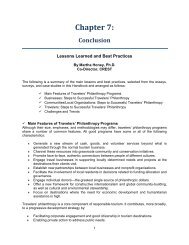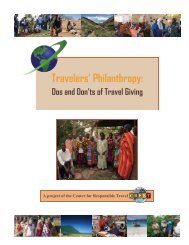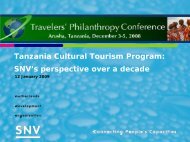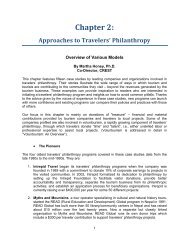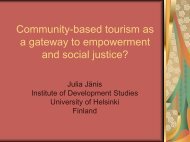Travelers' Philanthropy Handbook - Center for Responsible Travel
Travelers' Philanthropy Handbook - Center for Responsible Travel
Travelers' Philanthropy Handbook - Center for Responsible Travel
You also want an ePaper? Increase the reach of your titles
YUMPU automatically turns print PDFs into web optimized ePapers that Google loves.
Those surveyed also said that volunteer programs must be improved so that it is clear whatvolunteers can do and how they can help. Volunteers should be required to bring special skillsand training abilities and should not be used as cheap labor. They should share their knowledgeand never take jobs away from locals or do work the local residents could do.Further, they said that the government needs to learn more about and provide more support,incentives, and oversight <strong>for</strong> these philanthropic endeavors by tour operators. Many of thosesurveyed complained that the government pays no attention to the current philanthropicactivities, has no concept of what philanthropy actually is, and is suspicious that it is somehow asecret source of income <strong>for</strong> tour operators. Several said they believe it would be appropriate <strong>for</strong>the government to require travel companies to support community and conservation projectsthrough a portion of their corporate earnings.Finally, those interviewed noted that at present most of the projects receiving support areclustered around Arusha. In fact, travelers’ philanthropy contributions should be used to supportprojects throughout all of Tanzania, including Zanzibar.Quotes from the interviews on the topic of recommendations:“Transparency.”“Monitoring of expenditure.”“Change from ad hoc unstructured help on request to long term commitments.”“Provide something that is not available, e.g. training, skills. Always take local workers ifpossible.”“Voluntourism should bring real benefits, not only as experience <strong>for</strong> the volunteer.”“One joint initiative of tour operators in the area to manage the donations and evaluatethe effectiveness of projects.”“Create a joint initiative, a so-called Tour Operators Initiative on <strong>Philanthropy</strong>.”“The management of the money and the evaluation of the projects must be improved.”“Build empowerment through philanthropy that is in it <strong>for</strong> long term and dealing with rootissues of justice and sustainability.”“Formulate policies which will encourage all tourism stake holders or operators to spendapart of their earnings on social development.”Transferring the successes and lessons learned from the Arusha area to other traveldestinations seems possible. However, this case study will be most applicable in places wherethe current conditions are generally similar to those in Tanzania’s Northern Safari Circuit. Forstarters, there must be a core group tour operators motivated to support local projects andorganizations. There must be a local community or communities that can identify which projectsare priorities and can work with the tourism businesses to establish transparent, accountable,long-term operating systems. It also appears that travelers' philanthropy is most likely tosucceed in destinations with significant levels of alternative <strong>for</strong>ms of tourism (ecotourism,community-based tourism, pro-poor tourism, etc), together with stable political systems and safeconditions <strong>for</strong> visitors. Ideally, there would be an existing and mutually beneficial relationshipbetween tourism businesses and the host communities in order to provide the most solidlaunching point <strong>for</strong> a new travelers´ philanthropy program.158




